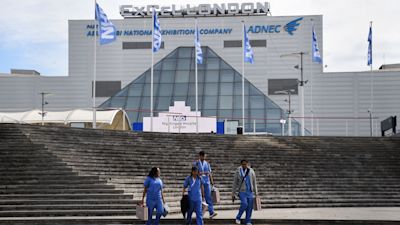Covid: Nightingale hospitals set up to deal with increase in cases will be closed

Nightingale hospitals set up to cope with a spike in Covid-19 cases are to close from April, although the sites in London and Sunderland will stay open for vaccinations.
NHS England said existing hospitals have been able to increase their beds so successfully that the Nightingales are no longer needed.
A network of seven hospitals in England was set up last spring amid fears that the health service may end up overwhelmed, as had happened in some other countries.
The Nightingale hospitals in England were largely not needed and some were stepped down to rehabilitation centres.
In January, the Health Service Journal (HSJ) reported figures published by minister for innovation Lord Bethell, which put the total cost of the temporary hospitals at around £532 million by the end of the 2022 financial year.
The estimate included costs for setting up the Nightingales, running costs, stand-by costs and decommissioning costs.
An NHS spokeswoman said: “Since the very early days of the pandemic the Nightingale hospitals have been on hand as the ultimate insurance policy in case existing hospital capacity was overwhelmed but, as we have learned more about coronavirus, and how to successfully treat Covid, existing hospitals have adapted to significantly surge critical care capacity, and even in the winter wave – which saw more than 100,000 patients with the virus admitted in a single month – there were beds available across the country.
“Thank you to the many NHS staff and partners who worked so hard to set the Nightingales up so swiftly and of course the public who followed the guidance on controlling the spread of the virus and helped to prevent hospitals being overwhelmed.”
She said vaccination services will continue at London and Sunderland to support the NHS vaccination programme.
In a video posted on Twitter, Health Secretary Matt Hancock said the closure of the Nightingale hospitals was an “important moment in our national recovery”.
He said the hospitals were a “monument to this country’s ability to get things done fast when it really matters” and played a “critical role” in the UK’s response to coronavirus.